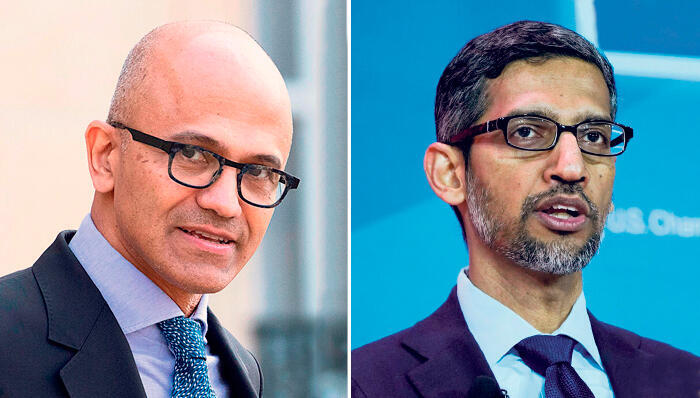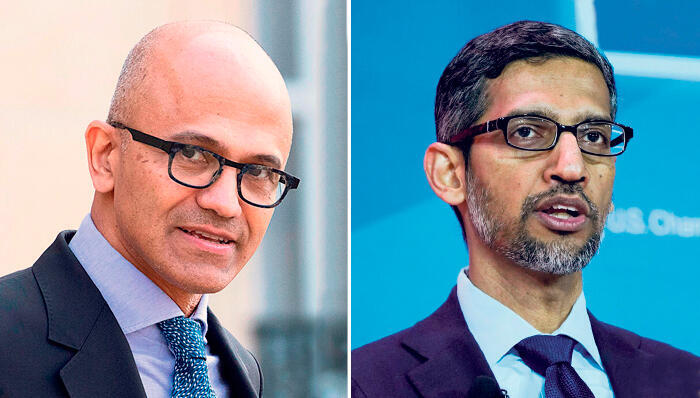
Big Tech continues to soar as GenAI convinces Wall Street to reject overpricing predictions
Around 80% of the S&P 500 who have reported their earnings for Q4 of 2023 have exceeded expectations. Notably, reports from major companies such as Meta, Microsoft, and Amazon, which make up a significant portion of the index's growth, indicate a profound impact from the use of Generative AI
Wall Street entered the current reporting season with a consensus that stocks are overpriced. However, since around the end of October, U.S. indexes have consistently broken records, with only brief pauses. The S&P 500 index is on the verge of reaching a historic level of 5,000 points, after concluding last week with a 1.4% jump, while the Dow Jones and Nasdaq posted gains of 1.4% and 1.1%, respectively.
Despite ongoing discussions about the fragility of this rally, which followed a disappointing Santa Claus rally at the beginning of the year, there are no signs of weakening. The earnings multiple of the S&P 500, a key market pricing indicator, has decreased from 24 in the second quarter to 23 in the fourth quarter, and now stands at 22. While these levels are relatively high from a historical perspective, they still leave room for increases, especially considering the positive results from the ongoing financial reports.
Half of the index companies, including significant tech companies, have already reported their financial results, with 80% exceeding expectations. Notably, reports from major companies such as Meta, Microsoft, and Amazon, which make up a significant portion of the S&P 500's growth, indicate a profound impact from the use of Generative AI.
Despite uncertainties and discussions about upcoming interest rate cuts, the U.S. economy's robust performance has meant the Fed has kept them unchanged. The latest employment report, revealing the addition of 350,000 new jobs, suggests that an interest rate cut is unlikely in the near future. Investor focus seems to be elsewhere though, possibly driven by the anticipation of a revolutionary shift thanks to artificial intelligence progress. Could it be that this underlying sentiment, whether technology-driven or not, is what is ultimately driving this surge?
Judging by the story told in last week's reports by tech’s "Magnificent Seven", this is indeed what is happening. Meta, Microsoft, and Amazon, which presented the best results, are also the ones showing the greatest delta in performance following the use of Gen AI.
Generative artificial intelligence entered the scene in November 2022, and since then, it divides companies into two categories: those that mention it in every press release because investors expect it and those that have genuinely put it to significant use in their solutions.
Other than Nvidia, which has not yet published reports for the fourth quarter and will do so only toward the end of the month, Microsoft is the most advanced and boldest in the field. Microsoft has leveraged its $10 billion investment in OpenAI for real applications used in Copilot, its 365 suite and, of course, in its cloud. This has led Microsoft to a value of more than $3 trillion, as investors strongly believe in its big vision of AI.
The remarkable story of the reporting season so far is that of Meta. Nvidia may yet overshadow it, but that would only strengthen the thesis of the AI revolution. Meta surged 20% on Friday and added about $200 billion to its value—the largest ever daily increase in dollar terms. It even surpassed Nvidia's extraordinary jump in May 2023, after publishing phenomenal reports and forecasts following the surge in demand for its AI chips.
Those looking for fragility and think that the story of the Magnificent Seven is close to being exhausted should look at the 10 sharpest daily increases and will find that most of them have occurred in recent years—all in the same stocks that have become monsters.
Meta's achievement first and foremost illustrates the importance of listening to investors, something that Israeli companies do not always excel at. Mark Zuckerberg, despite all the justified criticism, realized that the market is not excited by his vision of the Metaverse and does not really like it.
Meta abandoned this story quite quickly, embraced the story of artificial intelligence that investors are thirsty for, and was rewarded accordingly. Of course, it's not just a story, but also the fact that the implementation of artificial intelligence tools boosted Meta's advertising revenue, making it more efficient for advertisers and generating more revenue for Zuckerberg. Meta's historic decision to start paying a dividend is also an event that requires attention. On the one hand, dividend distribution signals a company's maturation and stabilization, and on the other hand, in technology companies, it is also a signal that it will have less cash left for purchases. When Meta announces its own purchase of shares for $50 billion at the same time as this dividend distribution, it is clear that the company believes there are not many stocks or companies more worthy of investment than Meta itself.
This is bad news for tech companies, including Israeli ones as it may mean that exits are less likely. Over the past decade, the Big Tech companies acquired several startups a year, but in 2023, they did almost nothing. Moreover, deals that were already signed have been canceled, as in the case of Adobe and the purchase of Figma for $20 billion and the cancellation of the purchase of iRobot by Amazon, just this week. Alphabet, Google's parent company, also did not make significant purchases in 2023 for the first time due to high interest rates and tight regulation. In its annual report, for the first time in years, there was no acquisitions chapter.
Meta's first dividend, expected to be $4.4 billion in 2024, places it at the level of traditional industry veterans McDonald's or Visa, which distribute similar amounts. The weekend's events in the stock were also dramatic for Zuckerberg, since even before the $175 million he is expected to receive every quarter from Meta's dividend, he is now worth $165 billion—more than Microsoft founder Bill Gates.














